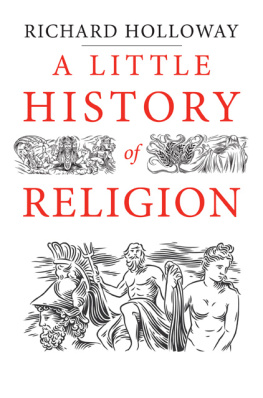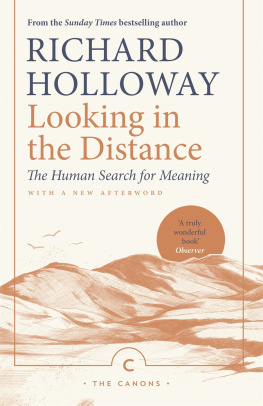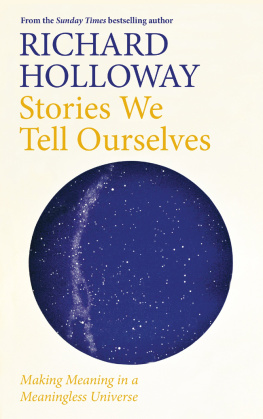
Praise for this book
Packed with hard-won insights based on the authors longstanding and unrivalled personal experience working in the civil society organization field, and drawn from his wide-ranging knowledge of relevant ideas, concepts and literature, this book is unlike any other you will read on the real worlds of civil society organizations. Read it and be inspired!
Professor David Lewis, Department of Social Policy,
London School of Economics & Political Science
Unravelling civil society and then explaining how to make developmental organizations effective is a tricky challenge. It takes a person of Richard Holloways insights and experience to do so in a real-life, practical way. Avoiding confusing theories and jargon, this books comprehensive guidance draws on and revisits proven ideas and tools that can feed confidence about what to do and how in the messy work for sustainable change towards social justice. It is not just recommended reading to those new to the field. Old hands would do well to reflect on the text as they deal with disruptive forces that are the daily reality of management with pressures to follow the (foreign) money, often at the cost of identity and values.
Alan Fowler is an emeritus professor of the
International Institute of Social Studies in the Hague.
Richard Holloway has distilled key lessons from decades of experience with strengthening civil society organizations around the world in this book. It offers practical advice for building civil society organizations to foster constructive social change in many different contexts.
L. David Brown, Senior Research Fellow (retired),
Hauser Center for Nonprofit Organizations, Harvard University
Congratulations! This is an invaluable book for those working in civil society organizations. It provides those whose hands are on the helms excellent guidelines on how to plan and execute their CSOs work, mobilize the resources needed and dodge the dangers that confront them. It is written by one of todays most able development practitioners and the sheer immensity and diversity of his experience is evident in every page of this compelling book.
John Clark, Chair of Board, Partnership for Transparency Fund

Practical Action Publishing Ltd
The Schumacher Centre,
Bourton on Dunsmore, Rugby,
Warwickshire, CV23 9QZ, UK
www.practicalactionpublishing.org
Richard Holloway, 2015
The right of the author to be identified as the author of the work has been asserted under sections 77 and 78 of the Copyright Designs and Patents Act 1988.
All rights reserved. No part of this publication may be reprinted or reproduced or utilized in any form or by any electronic, mechanical, or other means, now known or hereafter invented, including photocopying and recording, or in any information storage or retrieval system, without the written permission of the publishers.
Product or corporate names may be trademarks or registered trademarks, and are used only for identification and explanation without intent to infringe.
A catalogue record for this book is available from the British Library.
A catalogue record for this book has been requested from the Library of Congress.
ISBN 9781853399084 Hardback
ISBN 9781853399091 Paperback
ISBN 9781780449081 Library Ebook
ISBN 9781780449098 Ebook
Citation: Holloway, R., (2015) Managing Developmental Civil Society Organizations, Rugby, UK: Practical Action Publishing, .
Since 1974, Practical Action Publishing has published and disseminated books and information in support of international development work throughout the world. Practical Action Publishing is a trading name of Practical Action Publishing Ltd (Company Reg. No. 1159018), the wholly owned publishing company of Practical Action. Practical Action Publishing trades only in support of its parent charity objectives and any profits are covenanted back to Practical Action (Charity Reg. No. 247257, Group VAT Registration No. 880 9924 76).
The views and opinions in this publication are those of the author and do not represent those of Practical Action Publishing Ltd or its parent charity Practical Action. Reasonable efforts have been made to publish reliable data and information, but the authors and publisher cannot assume responsibility for the validity of all materials or for the consequences of their use.
Cover design by Mercer Design
Typeset by Allzone Digital Services Ltd
Printed in the UK
Contents
The context for this book is international development work and the place that citizens institutions have in this area.
Anyone involved in development work will be aware of the huge numbers of civil society organizations (CSOs) that exist all over the world (the only exception is perhaps North Korea). They will also be aware of the confusion in many peoples minds about what they are, how they work, to whom they are responsible, and what they have been able to achieve. This book is intended to clarify such issues, but is primarily intended to help those who have chosen to work in this field to understand better what they are doing, and what else they might do in the future.
There are many ways in which people are involved with CSOs:
Citizens may be concerned with an issue or a cause that is important to them and that they want to do something about and feel that they can do this best by joining others who feel the same way. Examples are a mother who has a disabled child, a student who seeks to combat corruption, a small trader who wants affordable credit, or a slum dweller who cannot get clean water.
Citizens may be encouraged by people outside their community to join together in a group or association to deal with an issue. Examples are a group formed by a government body to build a dam, a group formed by an NGO to encourage primary healthcare, or a group encouraged by outsiders to join a national rally.
Members of a CSO already working together on a topic that concerns them greatly may be trying to find the resources that will allow them to do more and be more effective.
Members of an NGO (that is, a more formal CSO) may be looking for other CSOs to work with that they consider are likely to be committed, competent, and able to undertake development work of one kind or another.
Government officials at the local or national level may find themselves approached by many different citizens groups with many different agendas, but may not know how to deal with them.
Professional funders of CSOs either from bilateral or multilateral organizations, from international NGOs, or from international foundations will be looking to support effective organizations that support the interests of the funders and that can be relied on to use their finances diligently, honestly, and capably.
There is an unfortunate tendency for this last group professional funders of CSOs to take on a role that is too dominant. Donor funding does not define CSOs they existed before foreign donors, and they can exist without foreign donors.
This book is to help those who are involved with CSOs to understand:
what a CSO is and what civil society is as a whole;














